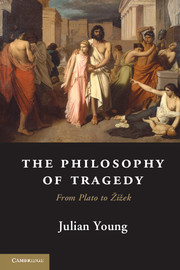Book contents
5 - Schelling
Published online by Cambridge University Press: 05 June 2013
Summary
Although Schiller had made some interesting remarks about tragedy a couple of years earlier, the first time tragedy becomes a topic of sustained philosophical concern in German thought is in the work of Friedrich Schelling (1775–1854). The ‘Tenth Letter’ in Letters on Dogmatism and Criticism, written in 1795, represents, too, the first appearance of the conviction, common to almost all nineteenth-century German philosophers, that great tragedy is Greek tragedy, that modern tragedy, even Shakespeare’s, never reaches the height attained by the Greeks. The approach to tragedy briefly outlined in the letter is developed to some extent in his System of Transcendental Idealism of 1800, but most thoroughly in his Lectures on the Philosophy of Art of 1802–3 (PA). It is these lectures that will form the principal focus of this chapter. Schelling’s writing is hard going. Even by German standards it is dense and elliptical, so it will be as well to begin by setting out the structure of his discussion in skeletal form. The essence of Schelling’s argument consists, it seems to me, in the following five claims:
(A) The task of philosophy is to address the conflict, but ultimately to demonstrate the compatibility, of ‘freedom’, on the one hand, and ‘necessity’ or ‘fate’, on the other.
(B) Reason, in the shape of philosophy, cannot achieve this task.
Hence
(C) To succeed where reason fails, we must turn to art.
(D) Of all the arts, only tragedy can reach this goal. Hence tragedy is the ‘highest’, the most ‘potent’ (PA, p. 248) of the arts.
(E) Tragedy shows that freedom is compatible with necessity by showing their identity.
- Type
- Chapter
- Information
- The Philosophy of TragedyFrom Plato to Žižek, pp. 68 - 94Publisher: Cambridge University PressPrint publication year: 2013

